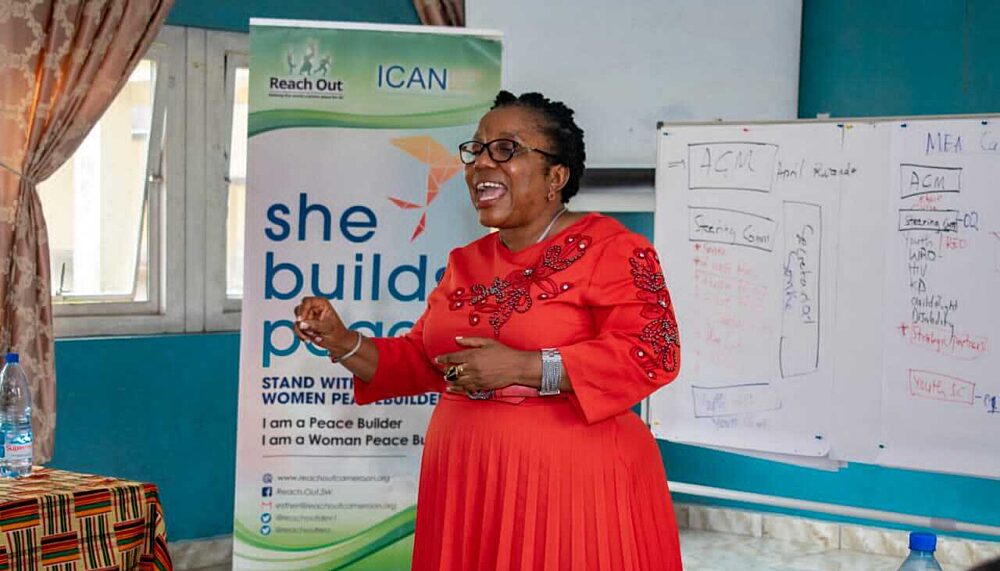BLOG POST | 30 Nov 2023
The crucial role of women mediators in war-torn Cameroon, and the risks they take
German Africa Prize 2023 awarded to the "1st National Women’s Convention for Peace in Cameroon"

In Cameroon, women mediators manage to broker deals amidst rampant violent conflicts. Our colleague Carla Schraml interviewed a group of them for her latest study.
By Carla Schraml
Amidst the ongoing violent crisis in the Northwest and Southwest regions of Cameroon, women play a prominent and crucial, but at times also risky role in resolving and preventing conflicts. They negotiate humanitarian access and passage, the cessation of violence, or the reopening of schools. I visited Bamenda, located in the Northwest of Cameroon, in February to conduct interviews together with Laura Anyola Tufon, Northwest regional coordinator of the Commission on Justice and Peace of Diocese Bamenda and faith-based mediator, for our latest study on women faith-based mediators.
During my time in Bamenda, I was both deeply shocked and impressed by the courageous and persistent efforts of women mediators, such as Laura, Esther Omam and many others. These women operate under harsh and risky conditions, where the safety of streets in Bamenda is compromised, and entering or leaving the city poses significant security risks and danger of harm. The women I talked to revealed that even during daylight hours, they faced threats, blackmail, and delays due to crossfire and ambushes on their way to interviews. They recounted numerous incidents involving themselves or their loved ones being ambushed, threatened, kidnapped, seriously injured, or killed.
A number of female mediators who formed the umbrella group "1st National Women’s Convention for Peace in Cameroon" has now been honoured with the German Africa Prize 2023 for their commendable work. In so-called “Lamentation Campaigns” more than 4,500 women dressed in black have protested against the ongoing violence and for the reopening of schools: “We as mothers [gathered in order to] fight for our children and protest against the violence against our children”, shares Esther Omam, Executive Director of Cameroonian organisation “Reach Out”, who will receive the prize alongside Marthe Wandou, founder and head of ALDEPA (Action Locale pour un Développement Participatif et Autogéré) and Sally Mboumien founder and executive director of COMAGEND (Common Action for Gender Development) on behalf of the group in Berlin.
The roots of the current crisis can be traced back to October 2016 when protests erupted after lawyers, teachers, and students took to the streets following the appointment of Francophone judges in English-speaking areas of the Republic of Cameroon. Since then, armed conflict has plagued the northwestern and southwestern parts of the country, involving various armed actors, including different factions of the Ambazonia Defense Forces, also known as “Amba” or “Amba boys”, as well as the local army, police and criminal groups. The “Anglophone Crisis” has resulted in over 6,800 casualties, hundreds of thousands displaced, and nearly 600,000 children deprived of education. The conflict has reached a deadlock and efforts for peace, including the Major National Dialogue in 2019, have faced limited acceptance and trust.
In the Northwest and Southwest regions, civilians continue to experience extensive armed violence. Trapped between various armed groups, government forces, and criminals, daily life includes shootings, kidnappings, assassinations, and other heinous crimes. The women in these areas do not have a choice but to deal with armed groups, government officials, or the military in order to try to stop violence or alleviate the suffering in their communities. In one of our interviews, Reverend Sr. Patience Muring, the head of the “La Verna Spiritual Center” in Bamenda in the Northwest of Cameroon, shared how she deals with “Amba” on a regular basis to negotiate for cessation of violence, and humanitarian access: “You often meet the boys out there, they live here in the neighborhood […]. We had a lot of fears at the beginning, now the boys and the war have become something we live with, try to be at home, we just face it.”
The women working for peace in the Northwest and Southwest of Cameroon face incomprehensible risks: They are at risk of being kidnapped, blackmailed, and threatened at gunpoint or – too often – seriously harmed by both armed groups or the military. But despite these threats, they manage to successfully broker deals that allow children to return to school, addressing a major point of contention in the power struggle between Amba and the government. Prominent figures like Reverend Sr. Patience Muring, her Catholic sister nuns, and Esther Omam have played vital roles in negotiating humanitarian access and organising campaigns that mobilise thousands to protest for an end to violence.
The recent recognition of the "1st National Women’s Convention for Peace in Cameroon" with the German Africa Prize is acknowledging and supporting the crucial work of these women. Congratulations to them for their dedication and resilience in the pursuit of peace!
The headline and text of this article were updated on 4 December 2023 to better reflect that the prize was awarded to the "1st National Women’s Convention for Peace in Cameroon" as a collective entity, rather than to individual members of the umbrella group.
Media contact
You can reach the press team at:
+49 (0) 177 7052758
email hidden; JavaScript is required


